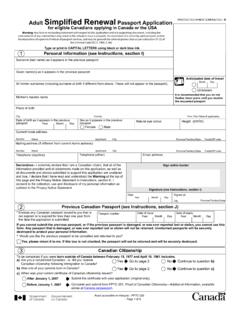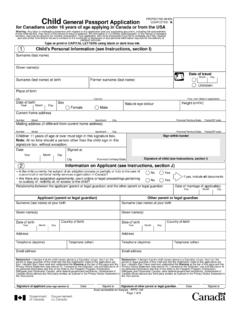Transcription of Health effects of cannabis - Canada
1 Health effects of cannabisThere are both potential therapeutic uses for and potential Health risks of using cannabis (marijuana). A chemical called delta-9-tetrahydrocannabinol (THC) is responsible for the way your brain and body respond to cannabis . While it is used by some for therapeutic purposes, there are short- and long-term physical and mental Health effects that can be Health effectsWhile cannabis may make you feel relaxed and happy, you could experience unpleasant, unwanted or negative effects on your brain and on the brainThe short-term effects of cannabis on the brain can include: fconfusion fsleepiness (fatigue) fimpaired ability to.
2 Fremember fconcentrate fpay attention fanxiety, fear or panic freduced ability to react quicklyCannabis use can also result in psychotic episodes characterized by: fparanoia fdelusions fhallucinationsEmerging evidence suggests that a chemical in cannabis called cannabidiol (CBD) may help dampen some of the psychoactive effects of THC1 such as:1 Bhattacharyya et al. (2010) Opposite effects of delta-9-tetrahydrocannabinol and cannabidiol on human brain function and psychopathology. Neuropsychopharmacology 35(3): 764 74.
3 Fdisturbances in mood fpsychotic symptomsThere is also evidence to suggest that combining tobacco with cannabis can increase: fthe strength of some psychoactive effects2 fthe risk of poor mental Health outcomes,3 including dependenceEffects can be felt within seconds to minutes of smoking, vaporizing or dabbing cannabis . These effects can last up to 6 hours or longer. If you eat or drink cannabis , these effects can occur within 30 minutes to 2 hours and can last up to 12 hours or on the bodyThe short-term effects of cannabis on the body can include: fdamaged blood vessels caused by the smoke4 fdecreased blood pressure, which can cause people to faint or pass out fincreased heart rate, which can be a danger for people with heart conditions and can lead to an increased risk of heart attack52 Ramo et al.
4 (2015) Tobacco and marijuana use among adolescents and young adults: a systematic review of their co-use. Clinical Psychology Review 32: 105 121. Schauer et al. (2017) Marijuana and tobacco co-administration in blunts, spliffs, and mulled cigarettes: a systematic literature review. Addictive behaviors. 64: 2011 211. Wang et al. (2016) One minute of marijuana secondhand smoke exposure substantially impairs vascular endothelial function. Journal of the American Heart Association. 5(8). Thomas et al. (2014) Adverse cardiovascular, cerebrovascular, and peripheral vascular effects of marijuana inhalation: what cardiologists need to know.
5 American Journal of Cardiology 113(1): 187 90. effects OF CANNABIS2 ImpairmentThe THC in cannabis can impair your ability to drive safely and operate equipment. It can also increase the risk of falls and other accidents. This is because THC can affect your: fcoordination freaction time fability to pay attention fdecision-making abilities fability to judge distancesCannabis use can increase the risk of accidents that lead to injury or death during higher-speed activities, such as driving, biking or can last for more than 24 hours after cannabis use,6 well after other effects have faded.
6 People who use cannabis regularly may have trouble with certain skills needed to drive safely7 for weeks after their last alcohol with cannabis greatly increases the level of impairment and the risk of injury or death from cannabis with other psychoactive substances, especially ones that have sedative effects , such as opioids and benzodiazepines, can increase the effects of the drugs. This could increase the risk of injury or harm, particularly with activities like effectsLong-term effects develop gradually over time with frequent use (daily or near-daily) that continues over weeks, months or years.
7 These effects can last from several days to months or longer8 after you stop using Leirer, V. O. et al. (1991) Marijuana carry-over effects on aircraft pilot performance. Aviat. Space Environ. Med. 62, 221 227. Karschner et al. (2016) Extended plasma cannabinoid excretion in chronic frequent cannabis smokers during sustained abstinence and correlation with psychomotor performance. Drug Testing and Analysis 8(7): 682 9. ,9 Meier et al. (2012) Persistent cannabis users show neuropsychological decline from childhood to midlife.
8 Proceedings of the National Academy of Sciences USA 109(40): E2657 64. on the brainThe long-term effects of cannabis on the brain can include an increased risk of addiction and harm to your: fmemory fconcentration fintelligence (IQ)9 fability to think and make decisionsThese effects appear to be worse for youth who start using early, and who use cannabis frequently and over a long period of time. They may not be fully reversible when cannabis use on the bodySome of the long-term effects of smoking cannabis on the body are similar to the effects of smoking tobacco and can include risks to lung Health , including: fbronchitis flung infections fchronic (long-term) cough fincreased mucus buildup in the throatPotential therapeutic usesThere is some evidence of potential therapeutic uses of cannabis or its component chemicals (cannabinoids).
9 Health Canada provides information for Health care professionals and for authorized patients on the use of cannabis and cannabinoids for medical purposes. This includes information on dosing, adverse effects , warnings and of illegal cannabisThere may be other Health and safety risks associated with cannabis obtained illegally. For example, the THC potency of illegal cannabis is often unknown, so you could end up using a stronger product than expected. This could heighten or prolong effects such as confusion or anxiety.
10 The quality and purity of illegal cannabis cannot be guaranteed and is frequently mixed with or contains: fpesticides fother drugs fheavy metals fmoulds or fungi fother contaminantsHEALTH effects OF cannabis Her Majesty the Queen in Right of Canada , as represented by the Minister of Health , 2017 Cat.: H129-73/2017E (Print) H129-73/2017E-PDF | ISBN: 978-0-660-08291-2 (Print) 978-0-660-08290-5 (PDF) | Pub.: 1700123 There is also the serious risk of: finteracting with criminals or criminal organizations fcriminal charge and prosecutionMental Health effectsIn some people, cannabis use increases the risk of developing mental illnesses like psychosis or schizophrenia, especially in those who.











